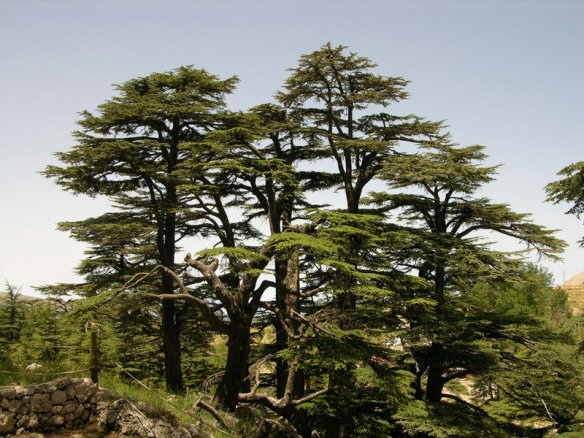Spiritual Sunday
Today I get the privilege of reading the Old Testament lesson to our recently reopened and newly named church (we are now St. Mark and St. Paul on the Mountain). The lesson itself works as a tree poem and it puts me in mind of a gorgeous Robert Haas tree poem, with both poems signaling new hope.
First, here’s Ezekiel (17:22-24)
Thus says the Lord God:
I myself will take a sprig
from the lofty top of a cedar;
I will set it out.I will break off a tender one
from the topmost of its young twigs;I myself will plant it
on a high and lofty mountain.On the mountain height of Israel
I will plant it,in order that it may produce boughs and bear fruit,
and become a noble cedar.Under it every kind of bird will live;
in the shade of its branches will nest
winged creatures of every kind.All the trees of the field shall know
that I am the Lord.I bring low the high tree,
I make high the low tree;I dry up the green tree
and make the dry tree flourish.I the Lord have spoken;
I will accomplish it.
The poem reminds me somewhat of Joyce Kilmer’s well-known poem “Trees,” which also sees trees sheltering winged creatures while lifting their arms up to the Lord:
A tree that looks at God all day,
And lifts her leafy arms to pray;
A tree that may in Summer wear
A nest of robins in her hair…
In Haas’s “The Apple Trees at Olema,” meanwhile, a couple comes across two “old neglected apple trees”—like Ezekiel’s dry tree—and are transported upward. She is “shaken by the raw, white, backlit flaring/ of the apple blossoms” while he “is exultant, as if something he felt were verified.” She “takes the measure/ of the trees and lets them in” while he finds that his dismay, like a thin moon, “fades like a scar in the sky to the east of them.”
The concluding image is one where the speaker, knowing that he has a home he can always return to, confidently ventures forth to wander among strangers. The tree of faith gives one that confidence.
The Apple Trees at Olema
By Robert Haas
They are walking in the woods along the coast
and in a grassy meadow, wasting, they come upon
two old neglected apple trees. Moss thickened
every bough and the wood of the limbs looked rotten
but the trees were wild with blossom and a green fire
of small new leaves flickered even on the deadest branches.
Blue-eyes, poppies, a scattering of lupine
flecked the meadow, and an intricate, leopard-spotted
leaf-green flower whose name they didn’t know.
Trout lily, he said; she said, adder’s-tongue.
She is shaken by the raw, white, backlit flaring
of the apple blossoms. He is exultant,
as if something he felt were verified,
and looks to her to mirror his response.
If it is afternoon, a thin moon of my own dismay
fades like a scar in the sky to the east of them.
He could be knocking wildly at a closed door
in a dream. She thinks, meanwhile, that moss
resembles seaweed drying lightly on a dock.
Torn flesh, it was the repetitive torn flesh
of appetite in the cold white blossoms
that had startled her. Now they seem tender
and where she was repelled she takes the measure
of the trees and lets them in. But he no longer
has the apple trees. This is as sad or happy
as the tide, going out or coming in, at sunset.
The light catching in the spray that spumes up
on the reef is the color of the lesser finch
they notice now flashing dull gold in the light
above the field. They admire the bird together,
it draws them closer, and they start to walk again.
A small boy wanders corridors of a hotel that way.
Behind one door, a maid. Behind another one, a man
in striped pajamas shaving. He holds the number
of his room close to the center of his mind
gravely and delicately, as if it were the key,
and then he wanders among strangers all he wants
